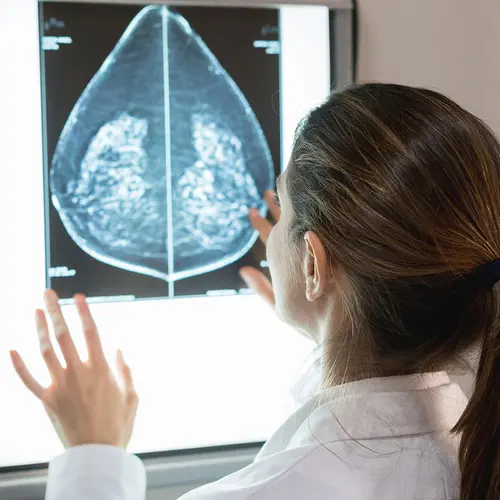A healthy diet helps you stay strong and feeling well while you treat metastatic breast cancer. A balanced diet helps keep you at a healthy weight, helps you recover after cancer treatment, and may even help prevent your cancer from coming back.
What’s a Healthy Diet?
Eat a variety of foods. A balanced diet gives your body the nutrients it needs. Include foods rich in protein, fats, carbohydrates, vitamins, minerals, and fluids to stay hydrated.
Protein gives your body fuel to grow and function, helps repair damaged tissues, and keeps your immune system strong. Extra protein in your diet helps you keep infections at bay during treatment and recover afterward. Eat protein-rich foods like:
- Meat, fish, poultry, or eggs
- Beans, lentils, or peas
- Nuts
- Peanut butter
- Low-fat dairy
- Soy foods like tofu
Fats are stored by your body for energy and also help your body absorb nutrients. Choose unsaturated fats that are heart-healthy, like olive, canola, sunflower, or fish oils. Eat fewer saturated fats like butter or fats in meats. Stay away from trans fats in processed foods like cookies because they can raise LDL or “bad” cholesterol.
Carbohydrates give your body energy. Fresh fruit, veggies, whole grains, beans, rice, or potatoes are all healthy sources of carbs. Candy, cake, and other sweets are high in unhealthy carbs that come from sugar. They’re usually also high in fats and low in other nutrients. Carbs that are rich in fiber, like those in vegetables and whole grains, may be good for women with hormone-dependent breast cancer. Try to get up to 30 grams of fiber each day.
Vitamins and minerals help your body function well. Antioxidants, like vitamins like C, A, and E, and minerals like selenium or zinc protect your healthy cells from damage. Eat a variety of fresh fruits and vegetables to get the vitamins and minerals your body needs. Fresh veggies like broccoli, kale, or cauliflower are rich in nutrients called phytochemicals that may be good for women with breast cancer. Studies show that they can help stop cancer cells from spreading and make them die faster.
Soy: Yes or No?
It’s safe and healthy to eat moderate amounts of soy foods when you have breast cancer. It’s a good source of protein, and it’s good for your heart. It also has compounds called isoflavones that may even protect your body from cancer.
Some studies on rats showed that the isoflavones in soy foods could increase breast cancer risk because they mimic the hormone estrogen in your body. High estrogen levels are linked to some types of breast cancer. But soy foods don’t contain actual estrogen. Also, studies on animals don’t always tell us how humans will respond. Studies in humans have shown either no effect or an actual reduction in breast cancer risk. Researchers think that in people, isoflavones block estrogen in the blood.
Soy foods include tofu, tempeh, soymilk, and edamame.
Weight-Gain Worries
You need to take in enough calories to keep your energy levels up during treatment. But chemo may make you retain fluid and gain a little weight. More than half of women with breast cancer put on weight while they’re in treatment. If you carry extra weight after your breast cancer treatment, the chances are greater that your breast cancer will come back. You’re also more likely to die of any cause, including breast cancer. A healthy, balanced diet and exercise help prevent weight gain.
Foods and Your Cancer Treatment
Cancer treatments like chemo and radiation can cause side effects like nausea, vomiting, diarrhea, constipation, loss of taste or smell, dry mouth, sore throat, and mouth sores. These effects may make it hard for you to eat or drink.
Here are a few tips for eating healthy during chemo or radiation:
- Eat several smaller meals each day instead of three big ones.
- Choose bland foods that may be easier to digest.
- If you’ve lost your sense of taste or smell, season foods with fresh herbs.
- Eat soft foods, like mashed potatoes or pudding, if you have mouth sores.
- Avoid spicy or greasy foods that might upset your stomach.
- If you have diarrhea, cut back on high-fiber and dairy foods.
- If you have constipation, eat more high-fiber foods and drink more fluids, especially water.
- If you have nausea, sip ginger tea.
Watch Alcohol and Salt Intake
Drink only a little alcohol or skip it altogether. Women who drink three to six alcoholic drinks a week have a 15% greater chance of breast cancer. Alcohol can inflame your liver as it works to break down chemo drugs. Alcohol can also worsen mouth sores caused by chemo.
Salty foods can raise your blood pressure. Avoid pickled, cured, or smoked foods that are high in salt.
Stay Hydrated Too
Drink plenty of fluids each day. Your body’s cells need water to function. Cancer treatments may cause vomiting or diarrhea that sap your fluid levels. Dehydration could be dangerous. Water also eases constipation during cancer treatment.
Get about 2 to 3 liters of fluid each day. Hydrate with liquids like water, milk, soup, or gelatin snacks.
Need help navigating metastatic breast cancer? Sign up for our free Advanced Breast Cancer Newsletter.

